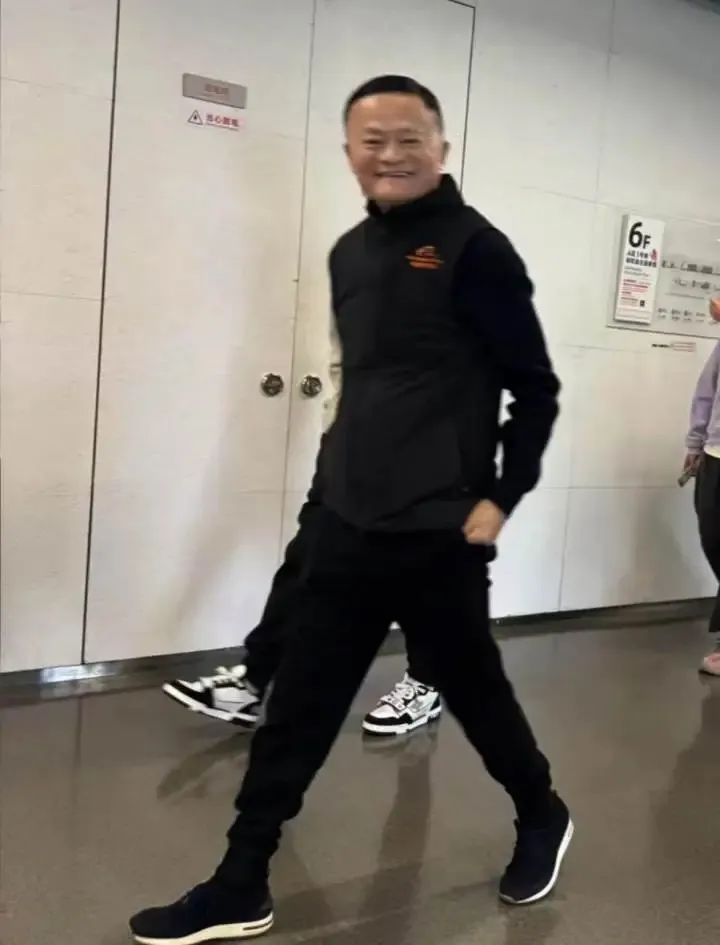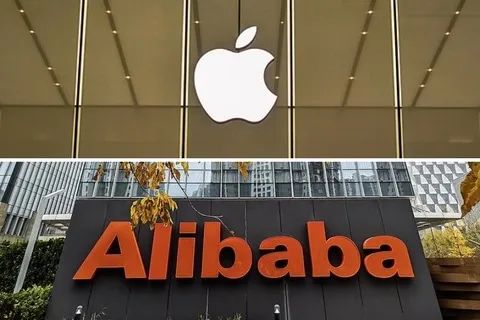Jack Ma Returns, Alibaba Being Reassessed
![]() 02/18 2025
02/18 2025
![]() 491
491

Edited by | Ji Ran
On February 17, at the Private Enterprise Forum, Jack Ma made a rare appearance at a government meeting and in the public eye.
Though Jack Ma has made public appearances several times in the past six months, this was his first participation in such a high-profile gathering. The meeting brought together leading private entrepreneurs from China's technology and manufacturing sectors, including Ren Zhengfei from Huawei, Lei Jun from Xiaomi, Wang Chuanfu from BYD, Zeng Yuqun from CATL, Wang Xingxing from Unitree Robotics, and Liang Wenfeng from DeepSeek.
From the official footage, we see close-ups of Ren Zhengfei, Wang Chuanfu, Lei Jun, and others speaking. Jack Ma sat on the sidelines of the first row, without a speaking role, yet his presence was enough to stir excitement among many.
Just days before attending the forum, Jack Ma also visited Alibaba's campus in Hangzhou and later traveled to a Hema Supermarket in Changsha. In just a week, this iconic figure of Alibaba made frequent appearances. More notably, Alibaba's capital performance shone brightly. Over a month, Alibaba's Hong Kong stock price soared from HK$80 to HK$125, with its market value jumping by HK$800 billion, reaching HK$2.3 trillion.
Rather than saying that the market is reassessing Alibaba, it is more accurate to state that Alibaba is narrating a new story, with AI as its backdrop.

Every time Jack Ma speaks, he emphasizes one word: AI.
On February 11, Jack Ma appeared at Alibaba's Hangzhou campus. From leaked photos, Jack Ma looked in good health, wearing a dark jacket with the Alibaba logo and smiling as he greeted employees. Some employees remarked, "(He) doesn't look like a 60-year-old at all."

Subsequently, Jack Ma also "scanned the buildings," visiting the two major work areas of Xianyu and Quark. Both Xianyu and Quark are part of Alibaba's Intelligent Information Business Group and belong to Alibaba's first batch of strategic innovation businesses known as the "Four Dragons." In January this year, Quark upgraded its brand slogan to "AI All-Rounder for 200 Million People," revealing a trend of accelerating its AI-to-consumer (AI To C) layout.
A couple of days later, Jack Ma was photographed visiting a Hema Supermarket store in Changsha's Vanke Mall. From December last year to January this year, Alibaba successively sold Intime Department Store and Sun Art Retail Group, seemingly scaling back its physical retail business in line with the strategy of "returning to Taobao and returning to the internet." However, this also suddenly increased uncertainty about Hema's future. Jack Ma's appearance at the Hema store this time may have been intended to boost Hema's "morale" and external confidence.
Certainly, Jack Ma's participation in the Private Enterprise Forum also brought confidence to more private entrepreneurs. Once regarded as a leading figure among China's internet private entrepreneurs, Jack Ma gradually disappeared from the public eye after the "Bund Summit Incident" in 2020. After four years, Jack Ma's frequent appearances and participation in high-profile meetings not only release favorable signals for the private economy but also demonstrate the country's support for private enterprises and the technology manufacturing industry.
Looking back from last year to now, almost every time Jack Ma appears or speaks, something significant happens at Alibaba.
In August 2024, Alibaba ended its three-year rectification period, completed its dual primary listing, and entered the Hong Kong Stock Connect, marking that it had passed a significant "test" at the compliance level. Soon after, in September, in an internal letter marking Alibaba's 25th anniversary, Jack Ma clearly stated, "We must acknowledge and correct yesterday's problems while also reforming for the future," mentioning that internet AI technology was once again surging, with fierce industry competition, and many of Alibaba's businesses facing the risk of being surpassed.
Sure enough, by November 2024, Pinduoduo's market value surpassed Alibaba's for the first time, sparking questions from the outside world. Jack Ma again spoke on the internal network, saying that "Alibaba will change, Alibaba will reform," and that the era of AI e-commerce had just begun, and Alibaba still had opportunities. In December 2024, Jack Ma participated in the 20th anniversary event of Ant Group. At the event, Jack Ma emphasized the development of AI, stating that the changes the AI era could bring in the next 20 years would exceed everyone's imagination.
In January this year, the list of selected teachers for the new session of the Jack Ma Foundation's Rural Teacher Program was announced, and Jack Ma paid tribute to rural teachers online. During the video call, Jack Ma shared his views on rural teachers and the development of the AI era, stating that the future world would be reshaped by AI.
It is evident that every time Jack Ma speaks publicly, he emphasizes one word: AI. Similarly, Jack Ma's recent frequent appearances have also been accompanied by Alibaba's significant moves in AI.
At the World Government Summit in Dubai on February 13 this year, Alibaba Chairman Joe Tsai announced that Apple had chosen Alibaba as a partner to develop AI functions for the Chinese version of the iPhone. This collaboration allows the market to see the value of Alibaba's AI, which is precisely the new story Alibaba has begun to tell.

Handshaking with Apple, seeing through Alibaba's new story
At the beginning of 2025, DeepSeek became a global sensation, making the outside world sit up and take notice of China's AI capabilities.
However, Apple is troubled by China's AI landscape. In the first quarter of fiscal year 2025, iPhone sales in China declined by 11.1% year-on-year. Apple CEO Tim Cook attributed part of this sales decline to the fact that the iPhone's AI functions had not been launched in China.
According to media reports, Apple tested different AI models from Chinese developers and once chose Baidu as its main partner. However, due to Baidu's failure to meet Apple's standards in developing smart models, the collaboration between the two parties was canceled. Apple began to consider other options and evaluated AI models developed by Chinese internet companies such as Tencent, Alibaba, and ByteDance, ultimately choosing Alibaba.
Joe Tsai also candidly admitted, "Apple has always been very picky, and they have talked to many companies in China. In the end, they chose to do business with us." Since Joe Tsai publicly appeared and acknowledged that Alibaba was lagging behind in 2024, he has made a total of three appearances, mentioning AI each time.

Why did Apple abandon Baidu and choose Alibaba instead? In fact, Apple has always been very sensitive to changes in the Chinese market and is extremely cautious in collaborations, often prioritizing the stability of its partners. This time, Apple replaced its partner midway, perhaps also out of considerations for stability.
Firstly, the collaboration partner chosen by Apple must be officially recognized to ensure political stability. Jack Ma's frequent appearances in the past have already sent a signal of his return to the outside world, and Apple naturally perceived this earlier than ordinary people. Jack Ma's participation in the Private Enterprise Forum this time is seen as a signal that Alibaba is entering a stable period and has successfully "passed the test."
Who attended and who was absent is a telling difference.
Secondly, Alibaba's technology and ecosystem can bring stability to Apple. For example, Alibaba's Tongyi Qianwen Qwen series open-source model ranks first in global downloads, with a relatively stable technological foundation; Alibaba Cloud has accumulated rich experience in handling high-concurrent traffic in supporting the annual "Double 11" event, demonstrating a stable ability to handle high-concurrent "tsunamis."
Additionally, Alibaba also has shopping and payment data from 1 billion consumers, providing a relatively stable ability to accurately understand the needs of Chinese users. For Alibaba, being selected by Apple means announcing to the world its advantages in AI and also opening up a new channel for its AI capabilities to be exported overseas.
An industry insider said, "This is a crucial springboard for Alibaba to transition from a 'Chinese e-commerce company' to a 'global AI service provider.'"

Re-recognize Alibaba's value
Over the past decade, most of the outside world's attention on Alibaba has focused on the e-commerce field, which is indeed Alibaba's fundamental business. However, now it may be time to re-evaluate Alibaba.
Because it is not just an e-commerce company but also a technology company.
In 2015, Alibaba's e-commerce revenue accounted for 82.59%, which dropped to 46.21% by 2024, while Alibaba Cloud's revenue accounted for 12.5% in 2024 and is still maintaining rapid growth.
For the general public, the most intuitive experience of Alibaba's AI and cloud computing came during this year's Spring Festival Gala. This year, Alibaba secured two "exclusives" for the Spring Festival Gala—Taobao as the "Exclusive E-commerce Interaction Platform" and Alibaba Cloud as the "Exclusive Cloud Computing AI Partner." In the martial arts performance "Writing with Brushstrokes" by Donnie Yen, viewers saw a "bullet time" scene like in a science fiction movie—the actor's movements were frozen in 360 degrees, and the perspective freely switched in the air. This was achieved by Alibaba combining AI algorithms, 3D modeling, real-time rendering of the Tongyi large model, and other technologies.
During the 2018 Spring Festival Gala, Alibaba attracted a large number of users with the "Empty Your Cart" activity. Seven years later, Alibaba returned to the Spring Festival Gala, but this time, the protagonist shifted from the shopping cart to cloud computing and AI, revealing Alibaba's internal transformation, namely technology leading development.
Over the years, Alibaba has continued to invest in technology and has gained widespread influence. In April 2023, Alibaba released its first large language model, Tongyi Qianwen, and now the Tongyi Qianwen Qwen large model has become one of the largest open-source model families in the world. Recently, AI researchers such as Li Feifei built the O1 and DeepSeek R1's s1-32B models with performance comparable to OpenAI, based on Alibaba's open-source model as the foundation, at a cost of less than $50. This also indirectly demonstrates the powerful capabilities of Alibaba's Qwen model.
While using technology to exert external influence, Alibaba is also using technology to internally reconstruct its business.
On the third day of taking over as Alibaba's CEO, Wu Yongming issued a letter to all employees establishing Alibaba's two strategic focuses: user-first and AI-driven. He stated that AI would become the core engine of Alibaba's "second growth curve," and all the group's businesses must fully embrace AI technology for reconstruction. Currently, Alibaba's various businesses are already integrating with AI, such as Taobao's "AI Stylist" and Xianyu's intelligent pricing system.
It can be said that Alibaba's technological undertone is becoming increasingly strong, various sectors are also undergoing changes, and core indicators are improving comprehensively. Morgan Stanley believes that Alibaba's total revenue for the third fiscal quarter is expected to increase by 8% year-on-year, which is 1 percentage point higher than market expectations and a significant increase from the 5% growth rate in the previous quarter.
In addition to Morgan Stanley, Citigroup has given Alibaba's American depositary shares (ADS) and Hong Kong stocks a "buy" rating, maintaining target prices of $138 and HK$137, respectively; Goldman Sachs has given Alibaba a "buy" rating with a target price of $117 for ADS and HK$114 for Hong Kong stocks. It is evident that capital is quite optimistic about Alibaba's future.
Over the past few years, Alibaba has experienced ups and downs, facing great uncertainty, and its stock price and market value have shrunk significantly. Nowadays, as the effectiveness of AI-driven business growth becomes increasingly apparent, and with Jack Ma's successful "test pass" and return, Alibaba's uncertainty coefficient is decreasing, and the market is also increasing its confidence in it.
In 1999, at Lakeside Garden, Jack Ma was an entrepreneur, and Alibaba was a disruptor, using the internet to reconstruct business. Today, Jack Ma has retired from the business world, but legends about him still circulate. And Alibaba also yearns to disrupt again, using AI to reconstruct itself and tell a new story.








